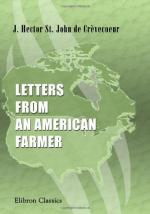clams, the oysters of the shores, with the addition
of Indian Dumplings, [Footnote: Indian Dumplings
are a peculiar preparation of Indian meal, boiled
in large lumps.] constituted their daily and most
substantial food. Larger fish were often caught
on the neighbouring rip; these afforded them their
greatest dainties; they had likewise plenty of smoked
bacon. The noise of the wheels announced the
industry of the mother and daughters; one of them
had been bred a weaver, and having a loom in the house,
found means of clothing the whole family; they were
perfectly at ease, and seemed to want for nothing.
I found very few books among these people, who have
very little time for reading; the Bible and a few
school tracts, both in the Nattick and English languages,
constituted their most numerous libraries. I saw
indeed several copies of Hudibras, and Josephus; but
no one knows who first imported them. It is something
extraordinary to see this people, professedly so grave,
and strangers to every branch of literature, reading
with pleasure the former work, which should seem to
require some degree of taste, and antecedent historical
knowledge. They all read it much, and can by
memory repeat many passages; which yet I could not
discover that they understood the beauties of.
Is it not a little singular to see these books in
the hands of fishermen, who are perfect strangers
almost to any other? Josephus’s history
is indeed intelligible, and much fitter for their
modes of education and taste; as it describes the
history of a people from whom we have received the
prophecies which we believe, and the religious laws
which we follow.
Learned travellers, returned from seeing the paintings
and antiquities of Rome and Italy, still filled with
the admiration and reverence they inspire, would hardly
be persuaded that so contemptible a spot, which contains
nothing remarkable but the genius and the industry
of its inhabitants, could ever be an object worthy
attention. But I, having never seen the beauties
which Europe contains, cheerfully satisfy myself with
attentively examining what my native country exhibits:
if we have neither ancient amphitheatres, gilded palaces,
nor elevated spires; we enjoy in our woods a substantial
happiness which the wonders of art cannot communicate.
None among us suffer oppression either from government
or religion; there are very few poor except the idle,
and fortunately the force of example, and the most
ample encouragement, soon create a new principle of
activity, which had been extinguished perhaps in their
native country, for want of those opportunities which
so often compel honest Europeans to seek shelter among
us. The means of procuring subsistence in Europe
are limited; the army may be full, the navy may abound
with seamen, the land perhaps wants no additional
labourers, the manufacturer is overcharged with supernumerary
hands; what then must become of the unemployed?
Here, on the contrary, human industry has acquired
a boundless field to exert itself in—a
field which will not be fully cultivated in many ages!




